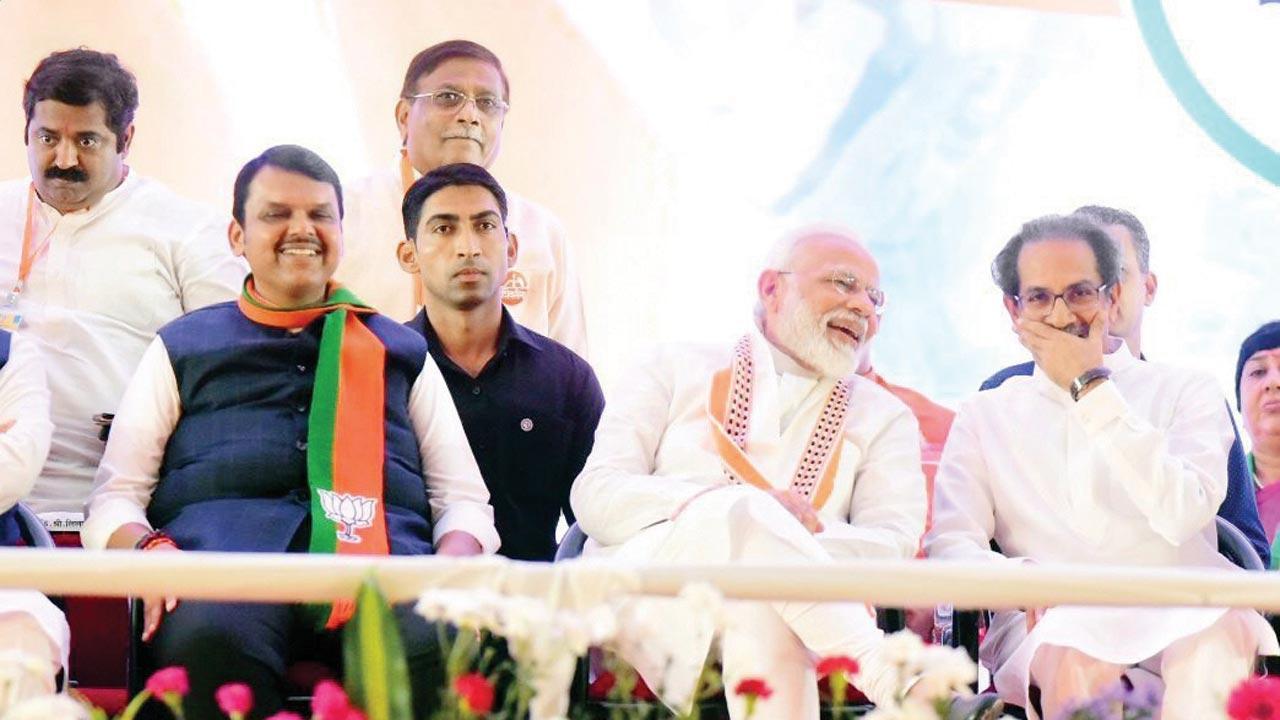The ruling and Opposition parties agreed on resolving the Other Backward Castes’ political quota issue, apparently because it threatens their vote bank interests

BJP leader Devendra Fadnavis with Prime Minister Narendra Modi and Chief Minister Uddhav Thackeray at a joint BJP-Shiv Sena rally in 2019. File pic
When it threatens their political interests, the ruling parties and opposition come together. Maharashtra saw such an effort last Friday, notwithstanding some jarring voices from both sides. What if such things happened very often, especially for public welfare and to keep the social fabric intact? Last Friday, the government was magnanimous in accepting the Bharatiya Janata Party’s (BJP) oft-repeated suggestion that the backward class commission (BCC) be constituted, and asked to establish the political backwardness of the other backward classes (OBC) whose political quota in the local self-governments has been stayed by the Supreme Court. To restore the quota, the state was asked to complete some procedures.
ADVERTISEMENT
Last Friday, the second all-party meeting held within a week, agreed to seek the BCC’s assistance, as was suggested by former chief minister and BJP leader Devendra Fadnavis in the budget session. Fadnavis had spoken about it immediately after the verdict and hasn’t changed his position. He feels vindicated now. But six months have elapsed since the SC verdict came. However, it was good on part of the MVA government’s CM, Uddhav Thackeray, that he had taken the initiative to constitute the BCC a couple of months ago. Perhaps it was the beginning of keeping one end open, if the state’s demand that the Centre should share the OBCs’ empirical data for getting the quota restored, doesn’t get approved. The MVA has made a formal request to the Centre and also moved the SC to get the empirical data from the Modi government. The hearing on September 23 may make things clear on this front. Till then, some MVA leaders can keep on accusing the Centre of not yielding and putting the state government in a fix, as it has been put in, in many matters even before.
The MVA and BJP have been sparring over multiple reservation issues in the state. While it has been facing ire over the scrapped Maratha quota, the verdict in the OBC quota posed an immediate threat to all parties, particularly in view of the upcoming local body elections, which assume the proportion of mini Assembly.
OBCs are one of the largest segments of the state’s 12 crore population. They decide the fate of political parties, so do Marathas. Of late, the OBCs have been made to understand, for political interests of some, that the Marathas will share their quota, if the state doesn’t get the nod to go beyond a 50 per cent ceiling for social reservations. Also, there is a growing demand for a caste-based census, so that the OBCs, who feel that their quota is not in proportion with their huge population, are counted for giving a fair deal through revision. We don’t know when such a census will happen in the state, or if the Centre will part with the census data for local bodies, which according to BJP leaders like Fadnavis, has errors and doesn’t reflect the true picture for using for this particular purpose of determining political backwardness. The MVA has countered the ex-CM’s claim very strongly. The debate over Fadnavis’ claims hasn’t ended, because the issue is expected to be argued against in the SC as well.
Many feel that the state backward class commission, if asked to find caste-wise empirical data, should be able to unravel the unknown, especially social backwardness of certain castes in Maharashtra. According to state Congress president Nana Patole, the BCC has asked for R450 crore to do the entire census-like exercise. The government, in all likelihood, may sanction the financial grant because of all-party interest.
What we want to say here is that parties should come together when the state is faced with several issues of public welfare, especially in times like the novel Coronavirus pandemic, infrastructure building and policies that adversely impact us if not framed properly, and not just when their vote bank politics stares at imminent danger. We would like to apply this suggestion not only to the state government but also the Centre that is accused of ignoring sane voices from the opposition and allies.
Dharmendra Jore is political editor, mid-day. He tweets @dharmendrajore
Send your feedback to mailbag@mid-day.com
 Subscribe today by clicking the link and stay updated with the latest news!" Click here!
Subscribe today by clicking the link and stay updated with the latest news!" Click here!






